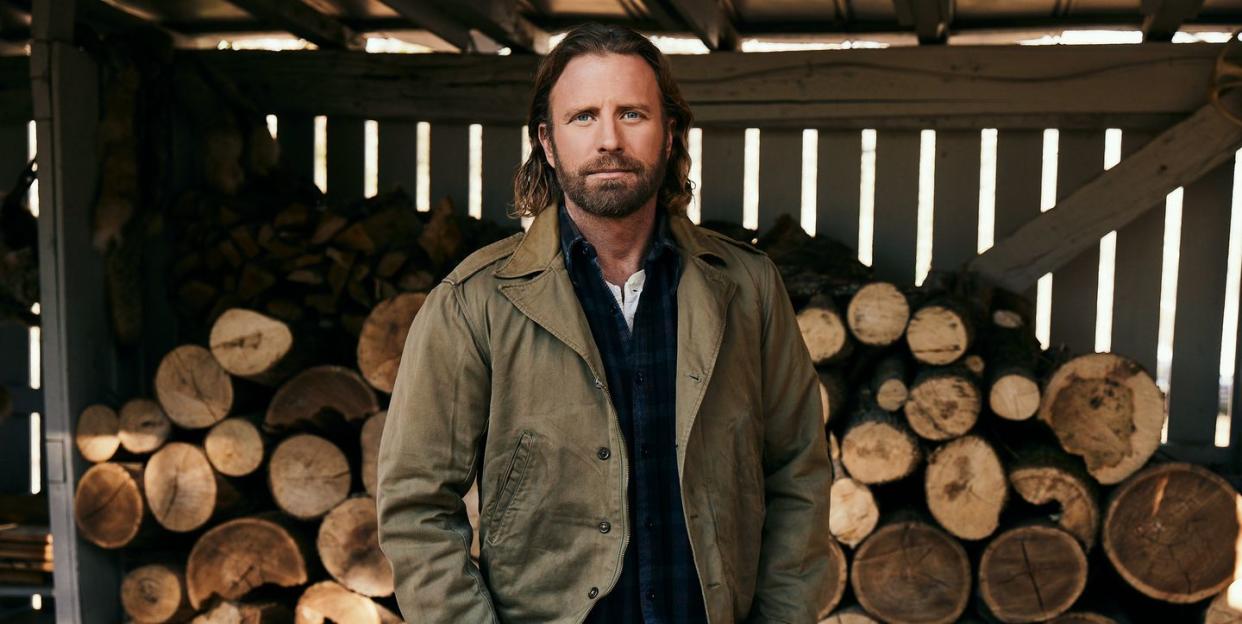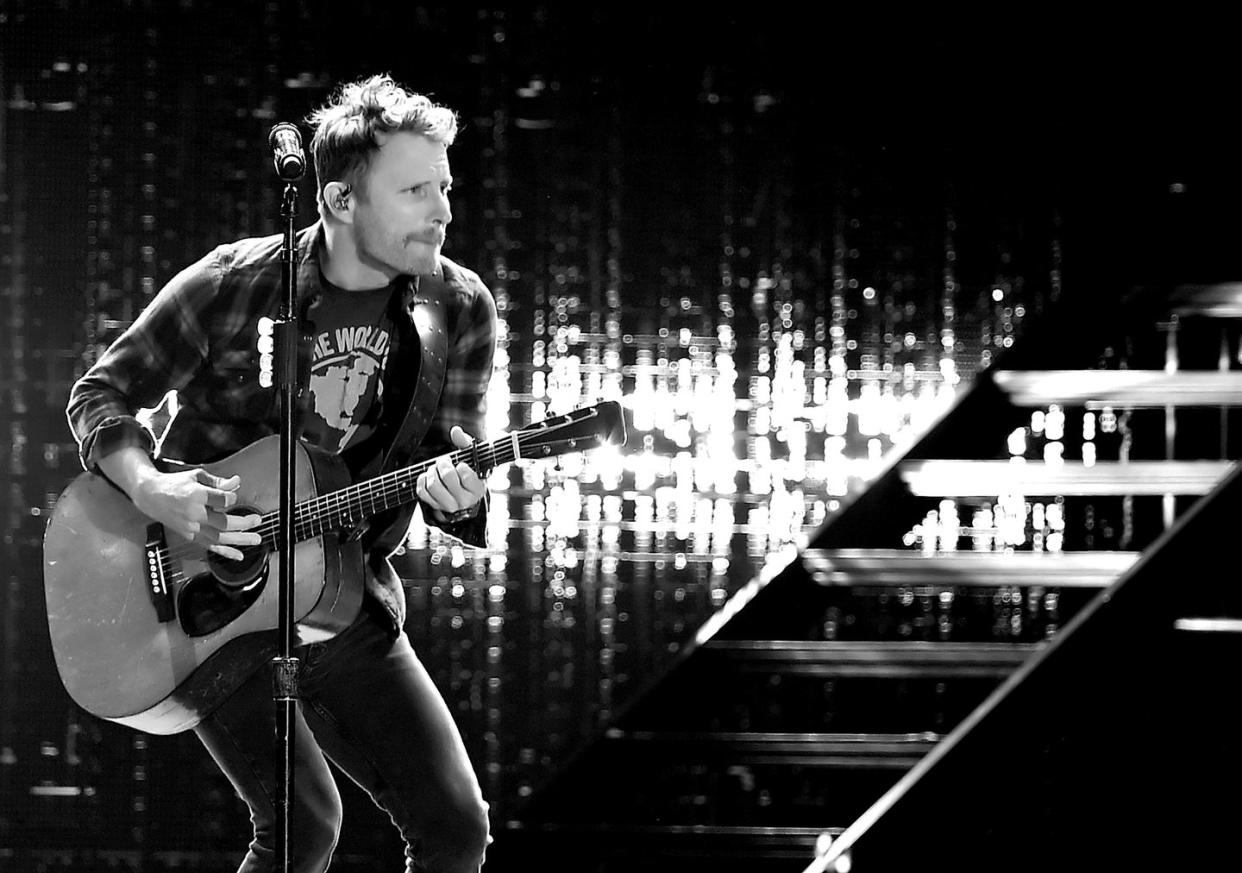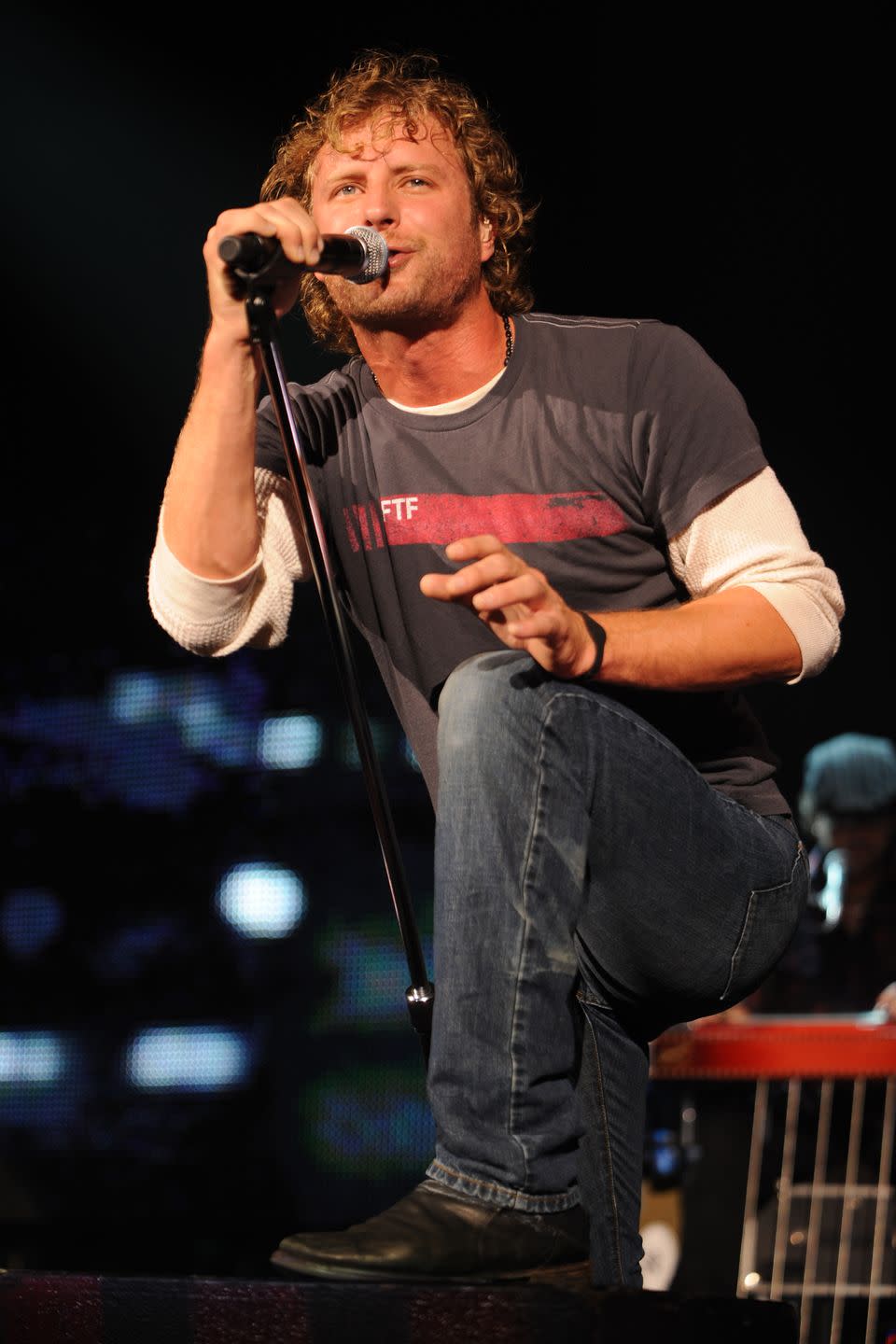Dierks Bentley Has New Dreams These Days

Dierks Bentley is ready for Christmas. A Christmas Story-style leg lamp in the window. Lights. A big ol’ Santa Claus who is, curiously, missing a head on the porch. Okay, almost ready. “I got to fix that,” Bentley says in mid-December over Zoom, giving me a virtual tour of his front yard. There’s also the year-round gear: a soccer goal, a collection of bikes that feels impossibly big for a family of five, and a net for pickleball, a sport that Bentley plays both at home and on the road. “That’s why I’m the champion,” he quips.
It's raining but Bentley is savoring this small stretch of quiet time ahead of him—the last few months before he returns with his first batch of new music since 2018’s The Mountain. He spent most of the pandemic in Colorado. Took the forced break. Stayed home. Holed up with his wife, three kids, and three dogs in their 1,200 square foot house in Telluride. “I put my guitar away,” he says of the moment when his calendar got wiped clean in the spring of 2020. “And I didn’t pull it out for a long time.” Instead, he got outside. Hiking, biking, and playing pond hockey. He went skiing, downhill and cross country. Embraced the safety he could find in fresh air. “I was so busy catching up on all the things I feel like I’ve missed out on in the last 20 years.”
It wasn't just a way to feel busy during a period of stillness. The experience fundamentally changed the way Bentley and his wife wanted to live once they returned to Nashville, as schools reopened and the music industry began to buzz again. “I don’t want to live behind fences or gates anymore,” Bentley says. The couple sold their previous home and downsized, settling into a new spot that’s just a bike ride from where the kids take classes and a few blocks from a pretty good coffee shop. “I knew I wanted to come back and be more part of community and neighborhood.”
Somewhere along the way he tried to start an album, his tenth. But the first, and even second full attempts weren’t clicking. He re-jiggered who he was working with, dropped some songs, wrote and picked up a few new others, and, eventually, took on producing the next batch himself alongside Jon Randall, Ross Copperman, and Reid Shippen. “That third time around,” he says, “was just magic.” Gravel & Gold, a collection of 14 tracks that testifies to everything Bentley does so well in song, will release on February 24.
In a wide-ranging conversation, Bentley, 47, opens up for the first time about his new record, how he approaches the road, and the toughest years of his career. This conversation has been edited for clarity and length.
ESQUIRE: Rumors of a new Dierks Bentley album have been kicking around for a while.
DIERKS BENTLEY: I always go into these going, “Is there an easier way to do this?” It’s always so hard. Waylon Jennings one time cut an entire album of Jerry Jeff Walker songs—can I just do that? Can I just cut a bunch of Hardy songs? He’s hot right now. For this record, I started over just writing almost every day. I couldn’t put my finger on why it wasn’t exactly right, but it didn’t feel like it was. Being my tenth album, I wanted it to be a collection of the traditional stuff, some bluegrass stuff, and, of course, the “commercial,” for lack of a better word, country music that I’ve been a big part of the last twenty years.
Shortly after releasing The Life of Pablo, Kanye West tweeted that he didn’t like the mix on “Wolves,” and then he fixed it and re-uploaded to streaming platforms. Now, you’re seeing stories about the Stranger Things creators going back and editing old episodes from previous seasons. As an artist, how do you know when something isn’t right and needs to be fixed and when to make peace with the fact that there will always be something you want to tinker with in your own creations?
I’m old school on that, for sure. Chet Atkins, he’s a legendary producer in this town, responsible for The Nashville Sound, for taking country music and launching it into the mainstream in a lot of ways. He left mistakes on records on purpose because, as a fan, you listen to that and you go, “What was an accident? Is that a mistake or is that genius?”
And I’m guilty of that too. Billy Strings heard one of the mixes on our song “High Note” and he texted me and said, “Hey man, is there a little bit of a tuner on my voice? I don’t want anything on it.” It’s a reminder that it’s okay to color a little bit outside the lines…But wow, could Kanye go back and re-edit some of his comments in the last two months?
If only he wanted to.
That’s probably where he needs to focus his energy.
COVID was the quietest time in your professional career since you debuted twenty-plus years ago. And I’m sure there have been plenty days when you’re grinding on the road that you fantasized about having such a cleared-out schedule.
Every country singer my age, we won’t admit it to you, but backstage at the awards shows, [we] do talk about, “Hey man, I’m really thinking about maybe taking next summer off.” But you can’t. You cannot take your foot off the pedal, or the next guy or girl is going to slide in there and take your spot.
Did it give you a new perspective on the calendar filling back up, now that it’s been able to?
When I came back to Nashville, I was like, “Okay, I’m actually excited.” I’ve been trying to get out of Nashville for 15 years! Wanting to go back to Arizona and kind of mopey at times around my wife—"I just want to go back out west, I’m sick of being here, I miss the climate, the topography…”
And being in a small neighborhood with good neighbors and walking distance to coffee is a big part of it, too. I needed a change. I needed to feel more a part of something.

We’ve heard you do a lot of styles over the years—bluegrass, pop country, honky tonky, humor—but I’m not sure we’ve ever heard you do as many styles at once as you do on Gravel & Gold. Were there times in your career where you felt that outside pressure to pick one lane and stick to it?
Absolutely. I’ve always wanted to be the serious country guy. There’s this song I had on my first record called “Wish It Would Break.” It was so well-written and stone-cold country. A couple stations liked it. They also liked the song called “What Was I Thinking?” I remember meeting with Mike Dungan [now the Chairman and CEO of Universal Music Group Nashville] and I had emails I’d printed up of program directors liking “Wish It Would Break.” He just looked at me and went along with it. And then a station in Seattle started playing “What Was I Thinking?” and that was it. [Ed: “What Was I Thinking?” became Bentley's debut single, eventually landing at No. 1 on the Billboard Hot Country songs chart; it also cracked the Top 25 on the all-genre Billboard Hot 100 songs chart.]
I’ve had a lot of moments in my career where I’m like that Garth Brooks song, “Unanswered Prayers.” Like, “Drunk on a Plane,” I almost didn’t put that on the record because I wanted to be the serious country guy. But this is who I am, whether I like it or not. I like having fun.
Was there a moment in your career where you felt real career anxiety that it may be over?
Absolutely. I really turned down a lot of opening tours. Instead, I was playing these rocks bars and clubs and doing crazy touring. We did like 26 shows in a row one time. We were out 300 days a year. But in 2006, I was direct support for Kenny Chesney, and everybody that had that position—Keith Urban to Rascal Flatts to Gretchen Wilson—that was their launch to headlining. So, here we go, this is my shot. And then I went out at the end of 2007 into 2008 and I just didn’t have the right collection of songs. I remember, the first show we played we had like 7,000 people and it felt great. And then a couple nights later we had 6,000 people and it never went back up again.
I ended up going back out on the road in 2009 and being an opening act with somebody and I was just so disillusioned by it all. It was so unmusical. The artist we were with wasn’t giving us any time to sound check. I was like, “I’m going to go make a bluegrass record.” I made this record with my friend Jon Randall, and I came back in 2010 and I had guys like Luke Bryan open for me. Florida Georgia Line was opening for me. These guys were out there just killing it! I go on stage after those guys with my bluegrass albums and singles I had before that...I didn’t have the arrows in my quiver to go out there and crush the show. Those were hard years.
How did you rehab your confidence after a stretch like that?
You build it up through songs. I remember seeing an article one that was on Billboard magazine with Jason Aldean on the cover and a little quote from Jason that said, “If you ain’t got the songs, you ain’t got shit.” That really affected me.
I was trying to write every single song on every album. I thought I was listening to outside songs, but I really wasn’t. And in the years ’07, ’08, ’09, I was a little lost. No matter how good the records were that I was making with Brett Beavers and Luke Wooten, I just didn’t have anything really to say. After my dad died and my son was born, that’s where “Riser” came from and “I Hold On” and these songs that had more meaning for me. I had a base to write from.

You have some exciting guests on this album. Tell me about pairing up with Ashley McBryde for “Cowboy Boots.”
I like to work with people that are easy to work with. I worked with Maren Morris; she came to the studio by herself that day. And Kacey Musgraves came into the studio by herself that day—just all alone. Same with Ashley. She came in and laid down the most beautiful vocal parts. I had her sing it five times, probably unnecessarily, but her voice was so cool.
Billy Strings is one of the most exciting young talents working anywhere in music. I love that this album ends with “High Note,” which features him.
I’m a huge Billy Strings fan. Acoustic guitar player Bryan Sutton, who plays on everybody’s records and is a legend in his own area, he called me one day and asked me if I’d heard of Billy probably about six years ago. He’s like, “You need to get turned onto him right now This guy is the future.” And his story—there could be a whole Netflix special on his childhood. I feel happy to be living in the same era, catching him in this, seeing all the different phases he’s already been through and where he is going.
Anyway, he wanted to be on “High Note”—I thought it fit him pretty well as he’s usually pretty high, and really fun to work with in the studio. Sam Bush came in; Jerry Douglas and Bryan Sutton were there. With bluegrass music, I’m a fan first and foremost. I just get to play it every now and then. Got a gig tonight down at the Station Inn, actually.
You’ve been a fan of the bluegrass shows at The Station Inn for decades—and it’s not a real big place. Playing it, I’ve got to imagine it’s a nice change of pace to be able to see every face in the room for a show.
It’s absolutely terrifying, that’s what it is. I mean, you have to stop between every song to tune the banjo—or someone’s got to. You have to work on your entertainer’s skills. You got to tell a joke or come up with a story on the spot or there’s a lot of silent moments.
New album usually means new tour, and touring is an interesting beast to think about. Financially, it’s the backbone of every musician’s life at this point. It’s also the thing that is the most detrimental to their health. Do you feel like you have a handle on it at this point or is there something about a new run of dates that feels unwieldy?
I’ve always said, I want to come out of this whole crazy industry better than I went into it, and there’s no reason why we shouldn’t. Some of our heroes didn’t have a choice. The guys like Johnny Cash and Waylon and George Jones—these guys had to drive themselves, or someone in the band had to drive to the next gig. Of course they’re taking pills. I try to be conscious of that, how fortunate we are. And I’ve done long bouts of sobriety. I don’t like being dependent on alcohol for my daily existence, and it can get like that for sure. It becomes something you don’t get to do. It becomes something you’ve got to do. “I have to drink so I can get back to level so I can go do this meet & greet…” You’ve got to manage it all.
I used to look at my career as one part of my life and then my family life as a separate part of my life. It’s really just one life. If you have a great career, but your home life sucks—or your home life’s good but your health is terrible, you’re not winning. I am competitive and it’s not about winning the battle, it’s about winning the war. I will have a successful music career, an awesome family, and I’ll be a great dad. I’m almost 50, I’ve had my moment. My job is to make sure they get the right platform so they can go chase their dreams and have their moments.
You Might Also Like
